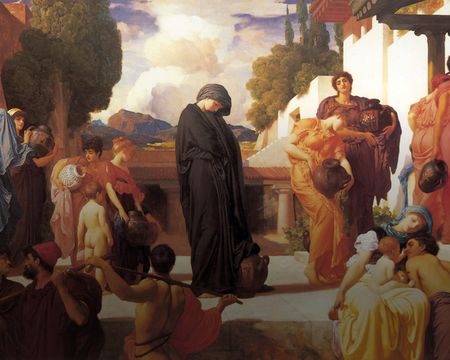Hector’s Choice
| “ |
For in my heart and soul I know this well: |
” |
Book 6 of Homer’s Iliad shows the contention in the heart of Hector, Ilium’s champion, but also a husband and new father: he is torn between his responsibilities as a hero to his people and as a the head of the household. Like so many soldiers going off to battle today, Hector is a new father who must risk his life to maintain his people’s way of life. Hector knows that Troy is doomed, but he must do his duty as champion and prince, even though it means the enslavement of his wife and child. In Hector’s plight, we see what is perhaps the utmost position of humanity in war: to lose does not mean just the death of the hero, but his death precipitates the death of the society that he protects.

At least one characteristic of the hero in the Iliad is his resolve to meet fate bravely. Hector communicates this belief to Andromache, before returning to the battlefield:
| “ |
Andromache, |
” |
Like in Oedipus’ anagnoresis, Hector’s position is much the same: while we cannot avoid our fate, we can decide how we’ll meet it. Our actions are our responsibility, even though, as Achilles muses in Book IX, death will claim us all: “The same honor waits / for the coward and the brave. They both go down to Death.”[2] In fact, while Hector and Achilles both seem to be considering death — under the extreme circumstances of war, what else would one think about? — they both approach it differently.
Hector is a family man, but he is a champion first. Even though his status as the son of Priam and Hecuba is a factor, his pride affects his position, and stokes his responsibility to his people: “I would die of shame to face the men of Troy / and the Trojan women trailing their long robes / if I would shrink from battle now, a coward.”[3] Hector is concerned about his place — and his perceived place — as champion; he must not let his people down. He even admonishes his brother Paris for not doing his duty, for languishing in his room instead of fighting. Yet, in this resolve — a resolve that will be put to the test in Book XXII — Hector’s responsibility will also win him glory and renown.

Achilles, on the other hand, questions the validity of this position. Since breaking with Agamemnon and the rest of the Achaeans, Achilles has obviously had some time to think about life. In Book IX, Agamemnon’s forces have been beaten back nearly to the ships and an embassy of heros is sent to Achilles to attempt to win him back to the battle, while Achilles sulks by his ships. After being surrounded by death, Achilles considers whether or not he should accept his responsibility as a hero. After all, he has two choices:
| “ |
If I hold out here and I lay siege to Troy, |
” |
Achilles has decided to choose the latter course; he is determined to set sail the next morning, having lost faith in the leadership and subsequently lost faith is his hero’s pride and glory. The champion of the Greeks even advises the others to flee, since defeat seems nigh.[5] It’s only after Patroclus’ death that Achilles is reminded of his duties to king and country, though he is motivated by that rage begun by Agamemnon and stoked to its full fury by Hector, and does his duty, establishing his fame, but cutting his life short.
Hector does his duty for his people, but Andromache’s lament for Hector and their son in Book XXII shows how duty to country is not always compatible to duty to one’s family. Yet, the death of the family is a microcosm of the reality of the Trojans: their culture, as it is now, is doomed. Hector’s death means the inevitable defeat of Troy.
notes
